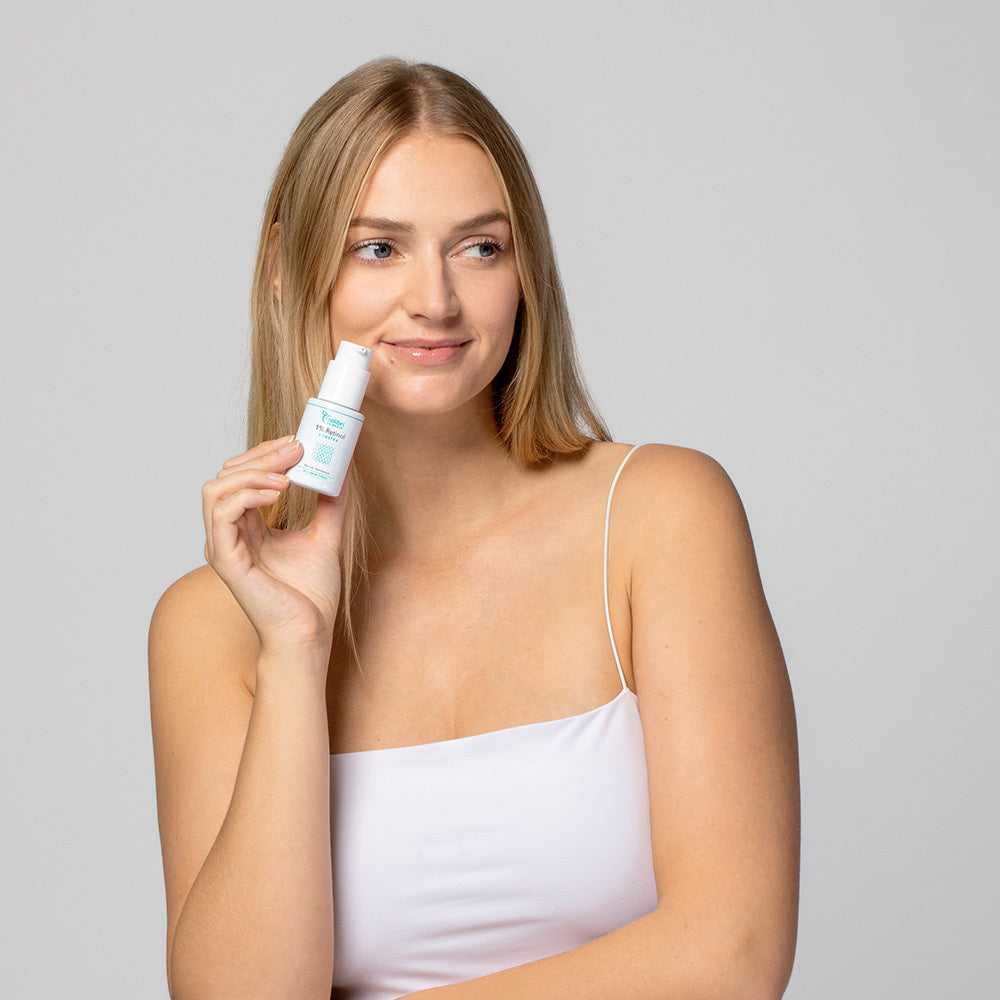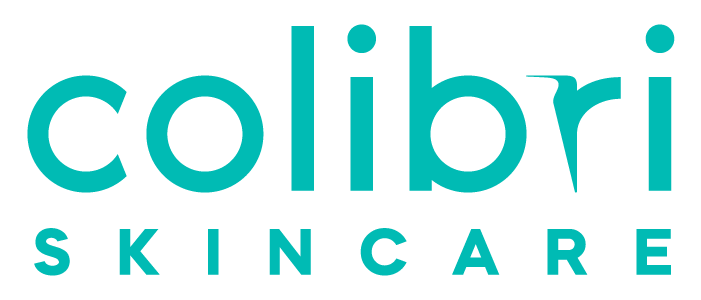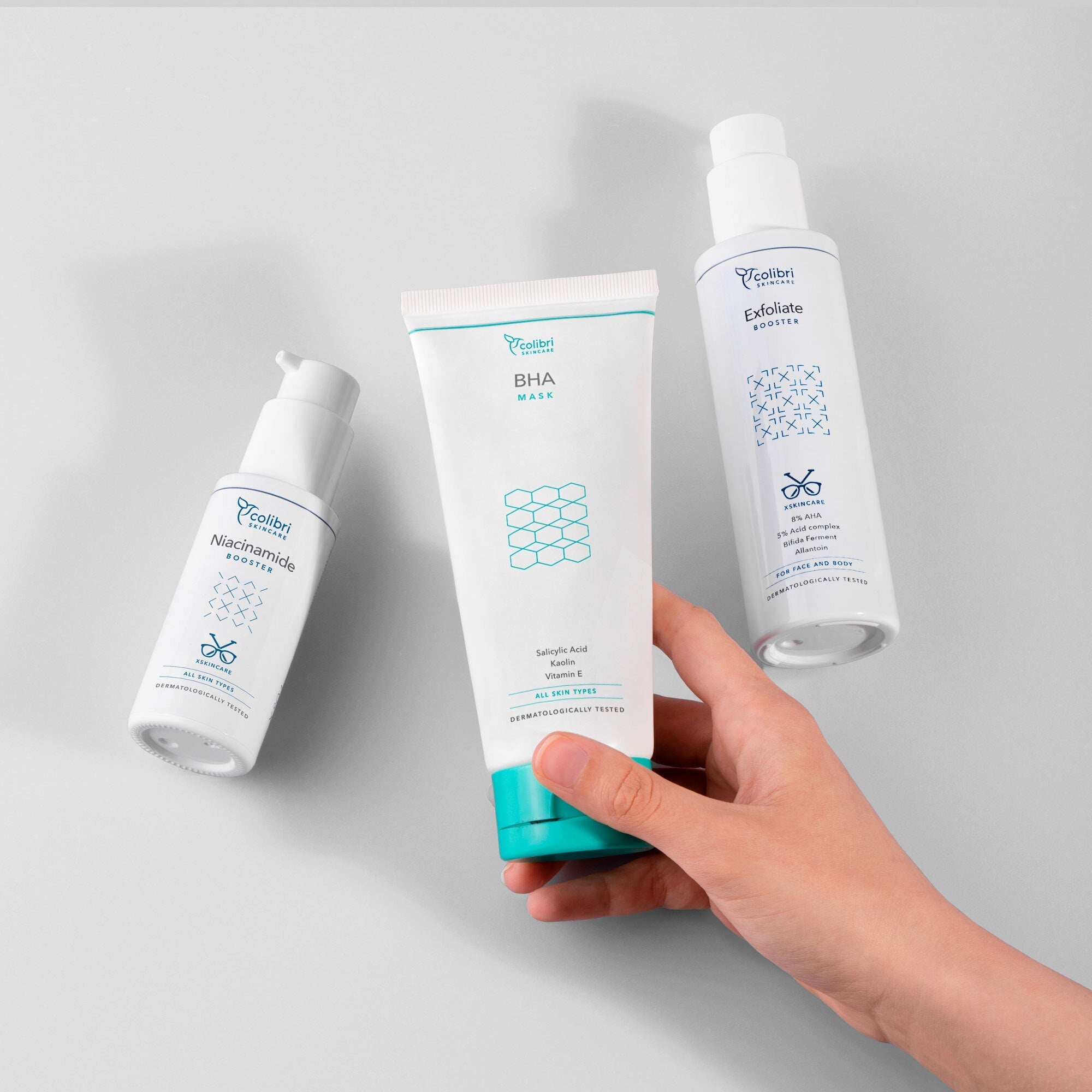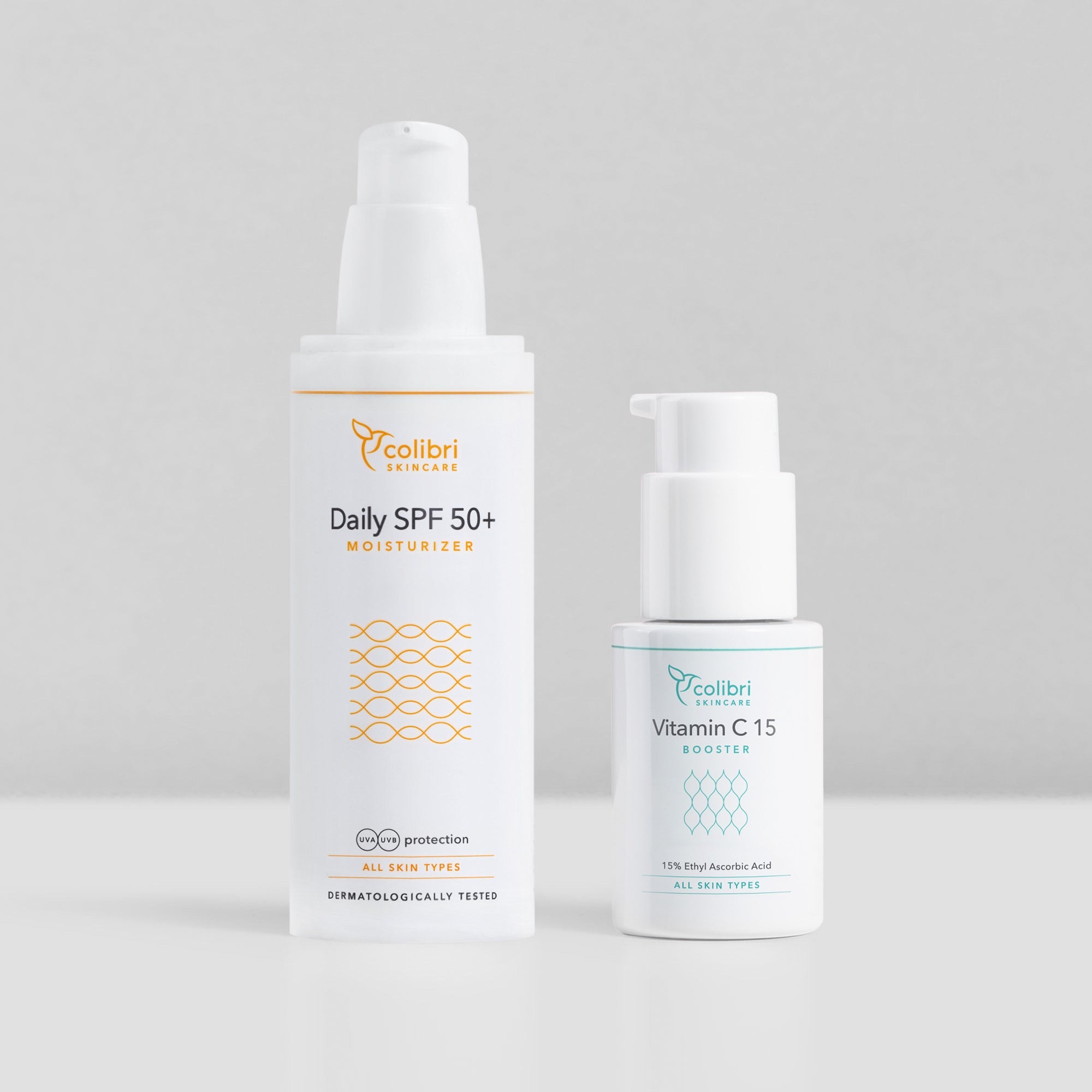
Miracle cure retinol? What it is and how it works
Retinol smoothes wrinkles, lightens pigmentation spots, improves skin elasticity and refines the skin's appearance - so it's a miracle product? One that can even be filled in cosmetic dispensers?
If you ask us: not quite, but certainly a highlight in active ingredient cosmetics.
In this blog post, we'll take a closer look at how you can use the positive effects of retinol for yourself and what exactly lies behind this active ingredient:
What is retinol actually?
Retinol is, to put it simply, a form of vitamin A.This vitamin plays an important role for your skin in forming new healthy skin cells and thus improving your skin's appearance. It stimulates collagen production in the deeper skin layers and ensures that fewer wrinkles smile at you in the morning in the bath.Usually the top layer of your skin, the epidermis, renews itself every 28 days. During this time, the lower layers of the skin produce new, healthy cells to replace the dead skin cells. This cycle, which unfortunately slows down with age, can be noticeably shortened by the effects of retinol.
Retin... what? Retinoid, retinol, retinal and retinoic acid.
To help you find your way through all the retinol terms, even without a degree in chemistry, here is a brief overview:
Retinoid
Retinoid is a collective term for vitamin A forms, which - in varying concentration and intensity of action - are found in cosmetic products.In the ingredients they are called, among others: Retinyl Palmitate, Retinol and Retinal. All these retinoids are converted by your skin, in up to 3 steps, to retinoic acid. This is the active vitamin A acid that your body needs to support the regeneration of your skin.

Retinol esters (Retinyl Propionate, Retinyl Palmitate, Retinyl Acetate, Retinyl Linoleate)
Retinol esters are the precursor to retinol.All of these different types of retinol esters that you can find in incis take three steps to convert to the active retinoic acid and are therefore the gentlest form of retinol. This means they work less effectively, but at the same time are gentler on your skin.
Retinol
Retinol is oxidized to retinoic acid in two steps, via retinal (retinaldehyde). Since it requires one step less, it is more effective than the retinol esters, but can therefore also lead to skin irritations more often. Especially in the beginning, you should approach the active ingredient slowly.
Retinal
Retinal, also called retinaldehyde, is converted to retinoic acid in only one step. Retinal is a relatively new active ingredient in cosmetic products and recent studies confirm that 0.05% Retinal reduces wrinkles as effectively as 0.05% retinoic acid.¹
Retinoic Acid
Only by means of the active retinoic acid, also known as vitamin A acid or tretinoin, can your skin achieve an improvement in its appearance. Due to the gradual transformation that your skin undergoes, active retinoic acid is at the end of each retinoid use. The more steps your skin takes to convert, the milder the effect of the resulting retinoic acid will ultimately be. Because it is not only very effective in its pure form, but also extremely irritating, it is only added to prescription products. These are issued, for example, on prescription, for the treatment of severe forms of acne.
How does retinol work?
Retinol stimulates the metabolism of the skin cells and accelerates the renewal of the horny cells of your uppermost skin layer. This refines the skin's appearance, your complexion looks more even and even annoying pigmentation spots can be visibly lightened by cell renewal.² In the deeper skin layers of the subcutis, retinol also supports the formation of collagen, which gives the skin its resilience, elasticity and youthfulness. More than that; it even prevents the breakdown of collagen and increases the capacity of the upper layer of the skin to bind moisture. This can significantly reduce the visibility of wrinkles and give the skin more tone. Moreover, retinol additionally acts as an antioxidant that captures free radicals, preventing them from damaging your skin and aging it prematurely. Depending on the concentration and tolerance of your skin, the first effect may be noticeable after only four weeks, but skin care requires patience and time - therefore, the effect may take several months to appear.

Application
Retinol can be found in creams or as a serum, which is usually more concentrated and can be used pure or added to skin care oils and creams. Since retinol is very sensitive to light and you should not expose your skin to sunlight immediately after application, it is recommended to use it in the evening. Depending on the skin type, retinol can have an irritating effect, especially at the beginning of the application, and lead to undesirable side effects such as dry skin, inflammation and redness. Especially the delicate skin around the eyes should be avoided or treated only carefully and with mild retinoids, such as retinol esters.We have already added 0.05% retinol to our colibri cosmetics night cream so that your skin can regenerate in the best possible way during the night. Even with this comparatively low concentration of retinol, your skin may initially show irritations. In this case, we advise you to pause for two nights between applications or to mix our night cream with a moisturizer until your skin has become accustomed to the retinol. When using cosmetic products containing retinol, you should always give your skin time to get used to the active ingredient. Depending on how sensitive it is to retinol, it may even be advisable to start with one or two applications a week and then slowly increase.
Can retinol also do harm?
Retinol is an extremely well researched active ingredient. In the EU, retinol may be added to non-prescription cosmetic products up to a concentration of 1%. However, this is already a very high concentration to which you should really get your skin used very slowly, because even for an insensitive skin the concentration is a challenge!There are recommended maximum limits for the absorption of vitamin A, but these are not to be expected from over-the-counter cosmetic products, as long as you do not overdose them and only apply them to the face, neck and décolleté area. Pay attention to how your skin reacts to the treatment and slowly introduce it to higher concentrations, preferably with a few days of breaks in between. As a precaution, pregnant women and women who are breastfeeding should avoid cosmetic products containing retinol. It cannot be ruled out with certainty that the active ingredient could cause damage to the child in the event of excessive intake, and this must of course be avoided at all costs.
The sun and retinol
Whether winter or summer, we generally recommend that you never leave the house without sun protection, because the UV radiation of the sun damages your skin at any time of the year and leads to faster skin aging. Sun protection is and remains the best anti-aging! If you use products with retinol, however, you should pay even more attention than usual to adequate sun protection and not use highly concentrated retinol products on summer vacation, when you expose your skin to the sun more intensively than usual. Retinol renews the horny cells of your epidermis and makes you more sensitive to light and more susceptible to sunburn and unsightly pigmentation spots. Exactly those we would like to avoid!
And what about the miracle?
So let's recap: With regular use, retinol slows down the aging process of your skin by forming collagen, protecting against free radicals and renewing skin cells. It reduces wrinkles, pigmentation spots, refines the complexion, smoothes the skin and gives it more elasticity. Is that enough for a small miracle? We would like to let your skin decide for itself.
Sources
¹ https://pubmed.ncbi.nlm.nih.gov/9843009/
² https://pubmed.ncbi.nlm.nih.gov/17515510/
³ https://issuu.com/bradleyhubbardmd/docs/reversal_of_skin_aging_with_topical



